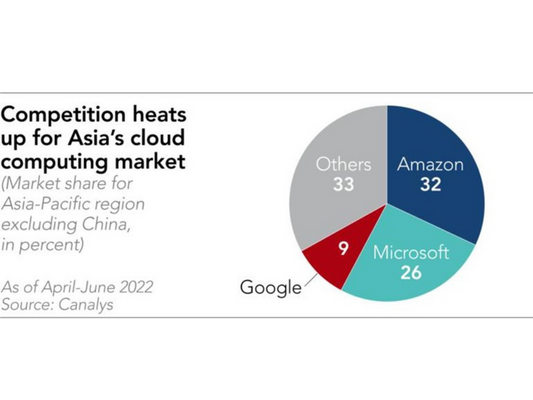GUANGZHOU/TOKYO/BANGKOK, January 15, 2023, /Nikkei/ -- Alibaba Group Holding and Huawei Technologies are among the Chinese tech companies rushing to build data centers in Southeast Asia to capture a red-hot market for cloud computing.
In November, Huawei marked the completion of a data center in Indonesia that drew roughly 30 local clients by the end of the year. The group will be able to further deliver digital innovation in Indonesia through the project, Huawei Indonesia CEO Jacky Chen said.
Indonesia is the third Southeast Asian country to host a Huawei data center, along with Thailand and Singapore. Over the next five years, Huawei will invest $300 million to develop cloud infrastructure in Indonesia, Chen said.
In the move toward a connected society, cloud computing is a key industry on the same plane as semiconductors. Huawei and other Chinese tech companies are keen on expanding into Southeast Asia due to the pandemic-induced shift toward digitalization.
Southeast Asia's digital economy was expected to grow 20% to $194 billion last year, according to a report conducted by Google, Temasek Holdings and Bain & Co. Data localization requirements implemented in the region have fueled demand for data centers.
Alibaba has been busy opening data centers in Southeast Asian countries, building its first one in Thailand just last year. The group said it would spend $1 billion over three years, starting in 2021, to develop data centers into an operation comparable in scale to its core online retail business.
Southeast Asia will be the epicenter of Alibaba's initiative to train 1 million workers in the digital field and support 100,000 tech startups.
Alibaba is not the only company assemble legions of workers to win cloud market share in the region. In Indonesia, Huawei looks to train 100,000 engineers and similar professionals and support 500 startups.
Meanwhile, growth has slowed for China's cloud market. In the third quarter last year, the Chinese market for cloud services grew just 8% from a year earlier to $7.8 billion, according to industry intelligence company Canalys.
Although growth had topped 50% in the first half of 2021, this year's economic slowdown has caused China's tech sector to cut investment.
For the Asian-Pacific region outside of China, the cloud computing market surged 30% to $8.7 billion in the third quarter last year. The region now accounts for 14% of the global market. For Chinese cloud companies, Southeast Asia is indispensable for growth.
Chinese players, however, have to contend with U.S. rivals who arrived first. Amazon, Microsoft and Google control approximately 70% of Southeast Asia's market combined, according to Canalys.
Amazon plans to spend $5 billion on Indonesia over the course of 15 years from 2021. The funds will go into building data centers that will expand Amazon's digital ecosystem.
Chinese tech companies will face a major challenge capturing market share from deep-pocketed U.S. peers that are already embedded into government and corporate systems.
The Chinese players are looking to gain market share through lower prices. Although direct comparisons on price points do not tell the whole story, "Chinese cloud service providers generally offer prices in Southeast Asia that are about half of the quotes of U.S. companies," said an analyst.
Narai Intertrade, the Thai company behind the Naraya brand of lifestyle products, now operates on Alibaba's cloud. One reason is many of Narai Intertrade's customers are located in China, the company said.
Another reason is "it's less expensive than other cloud services," said a Narai Intertrade manager.
But doing business with a Chinese cloud company carries risk because of tensions between the U.S. and China. The U.S. State Department has warned American companies not to use cloud services offered by Chinese providers over national security concerns.
Companies in the Asia-Pacific region "have to take diplomatic risk into account when selecting clouds," Forrester Research said in a note.
With the use of Chinese cloud services potentially impacting the ability to do business in the U.S., companies may opt for both American and Chinese cloud services to hedge against such risks.








